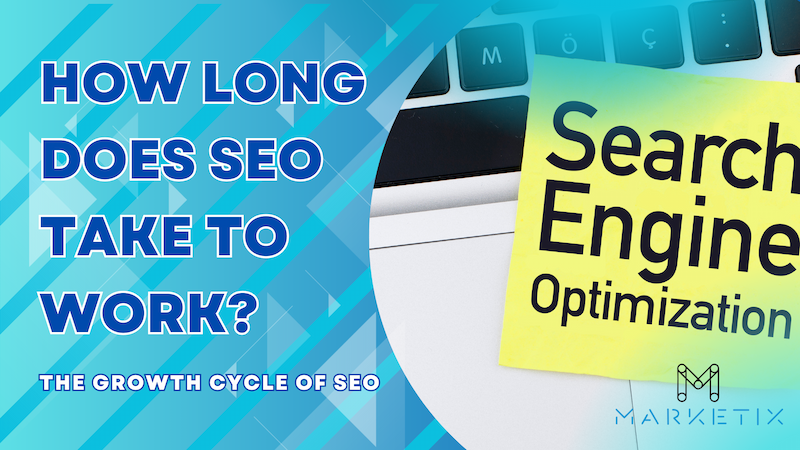- Home
- > The Marketix Blog
- > SEO
Troubleshooting Sudden Drop in Organic Traffic to Your Website
"Why is my website losing organic traffic?" This question troubles many business owners as they experience a decline in online visibility, leads, and sales.
This issue is becoming increasingly common. In fact, at Marketix Digital, with over 1,000 free website audits conducted, one recurring issue we consistently encounter is misaligned SEO strategies that fail to adapt to evolving search engine standards.
Various factors could be driving this downturn, from algorithm changes to technical glitches.
If you're experiencing a sudden drop in traffic, we offer this free guide to help pinpoint the root cause and set your website on the right path again.
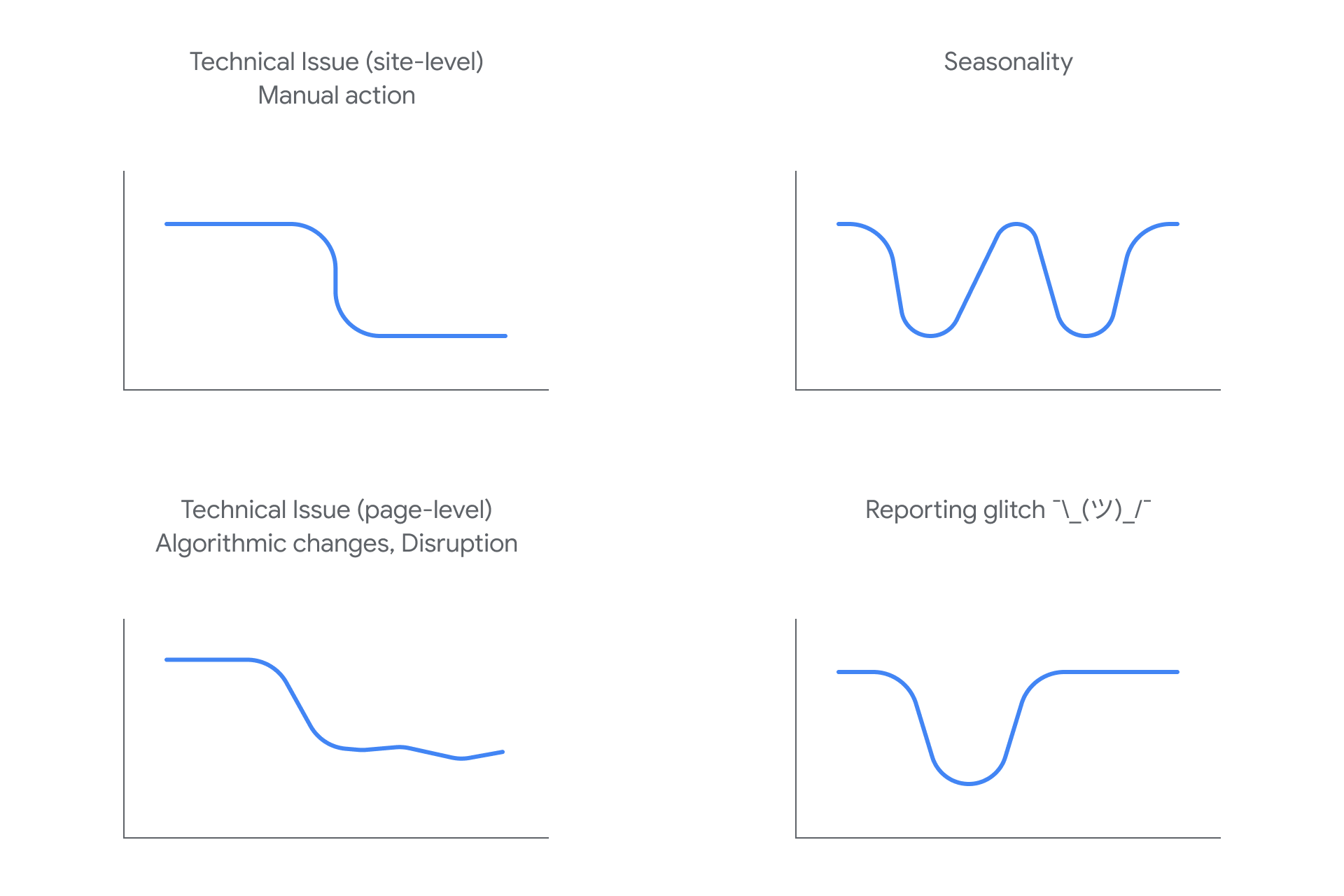
Google Algorithm Changes and Core Updates
Google’s algorithm updates and core changes are frequent and can drastically affect your website’s organic traffic.
In March 2024, Google rolled out a significant update aimed at improving the quality of search results by targeting spammy, low-quality content. This update, designed to enhance the helpfulness and reliability of search results, involves multiple core system changes. Websites with content that seems primarily crafted to attract clicks without providing real value are particularly affected.
Forums and Facebook Groups across the internet are filled with discussions from webmasters who noticed declines in their traffic following this update.
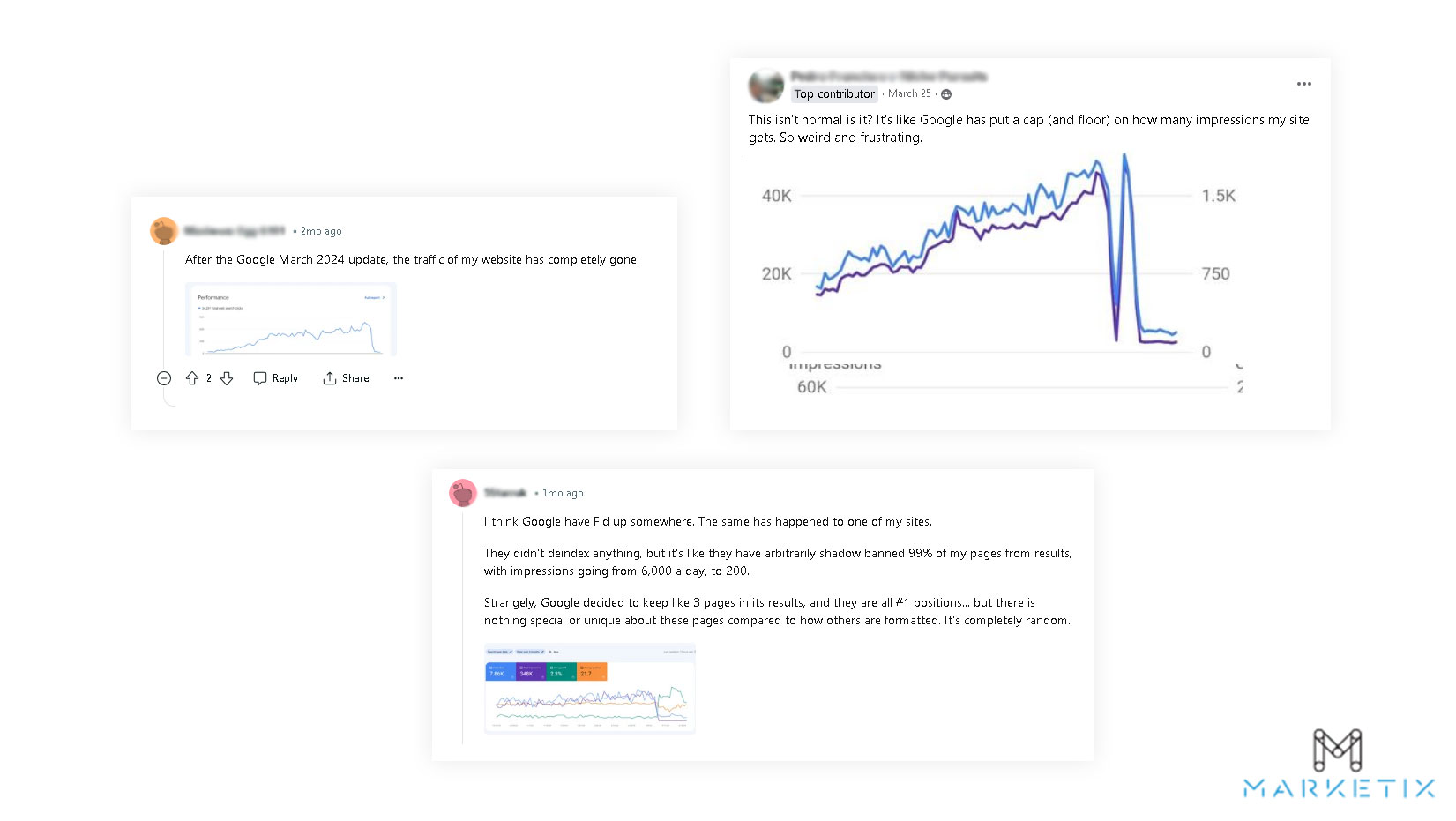
Here are Redditors and Facebook group members sharing their website's traffic drop after the recent Google Algorithm update in March 2024.
These anecdotal reports underline the impact of Google’s stringent new measures against unoriginal and spammy content.
Website owners must understand these updates as they can lead to significant volatility in search rankings. The key change in the recent update includes the enhancement of Google’s spam policies and quality ranking systems, aimed at reducing unhelpful content and promoting high-quality sites.
What Should You Do?
Google often states that updating content isn't necessary with each algorithm update, but website owners cannot afford to be complacent. Proactively reviewing and enhancing your website's content is important.
Now, the goal is to comply with each Google core algorithm update.
Start by auditing each page of your website and improve it using the standards in the recent Google core algorithm update. Remove or revise any content that might be considered low-quality or unoriginal. Make sure you regularly monitor the announcements from Google and adjust your content strategy to align with their latest guidelines.
A strong focus on high-quality, relevant content not only aids in recovering from traffic dips but also protects against future impact from algorithm changes.
Sudden Deindexing of Previously Indexed Pages
A concerning issue for many website owners today is the sudden deindexing of previously indexed pages. This problem can manifest as statuses like "Discovered - currently not indexed" or "Crawled - currently not indexed" in Google Search Console, indicating that Google is aware of the pages but has chosen not to include them in its search index.
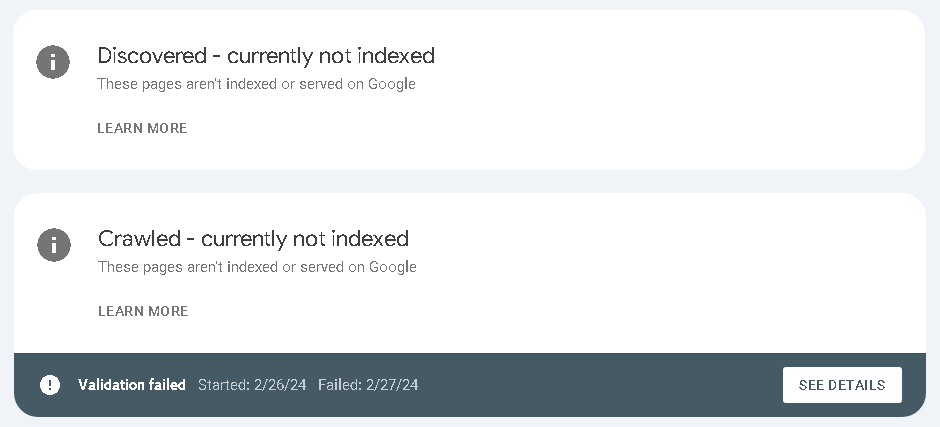
The reasons for deindexing can vary, but they typically relate to content quality, website structure, or technical issues that prevent Google from effectively crawling and indexing the content.
Deindexing can significantly impact your website’s visibility and organic traffic, as it removes pages from search results, making them inaccessible to potential visitors.
Webmasters need to monitor their website’s index status regularly and investigate any issues on time as you need to understand whether the deindexing is a widespread issue affecting multiple pages or a specific problem with individual pages.
Identifying the cause is always the first step in addressing this issue.
How To Address This?
To address deindexing, start by enhancing the content quality of the affected pages.
Make sure that the content is very comprehensive and provides value to your audience. It’s recommended to conduct a competitive analysis to see how your content stands against top-ranking competitors (page level) and make improvements where necessary.
If improving content does not resolve the issue, consider resubmitting the page on Google Search Console for reevaluation.

Alternatively, consider using tools like indexmenow.com or the Rankmath Instant Indexing feature. These tools can help prompt Google to reindex the pages by directly submitting them for indexing.
Lastly, building links to the deindexed pages can also be effective. Whether it's a backlink from another website, an internal link, or a link from one of your social media posts, each link acts as a pathway, increasing the likelihood that Google’s crawlers will find and index the page.
Seasonality
Seasonality can significantly influence web traffic, leading to periodic increases or decreases that align with specific times of the year.
Christmas decorations or gifts, for example, experience a surge in traffic and sales during the festive season, and vice versa, see a decline outside these periods. A drop in traffic during off-peak times is not necessarily indicative of a problem with your website’s SEO or content strategy but is rather a reflection of changing user interests and behaviours throughout the year.
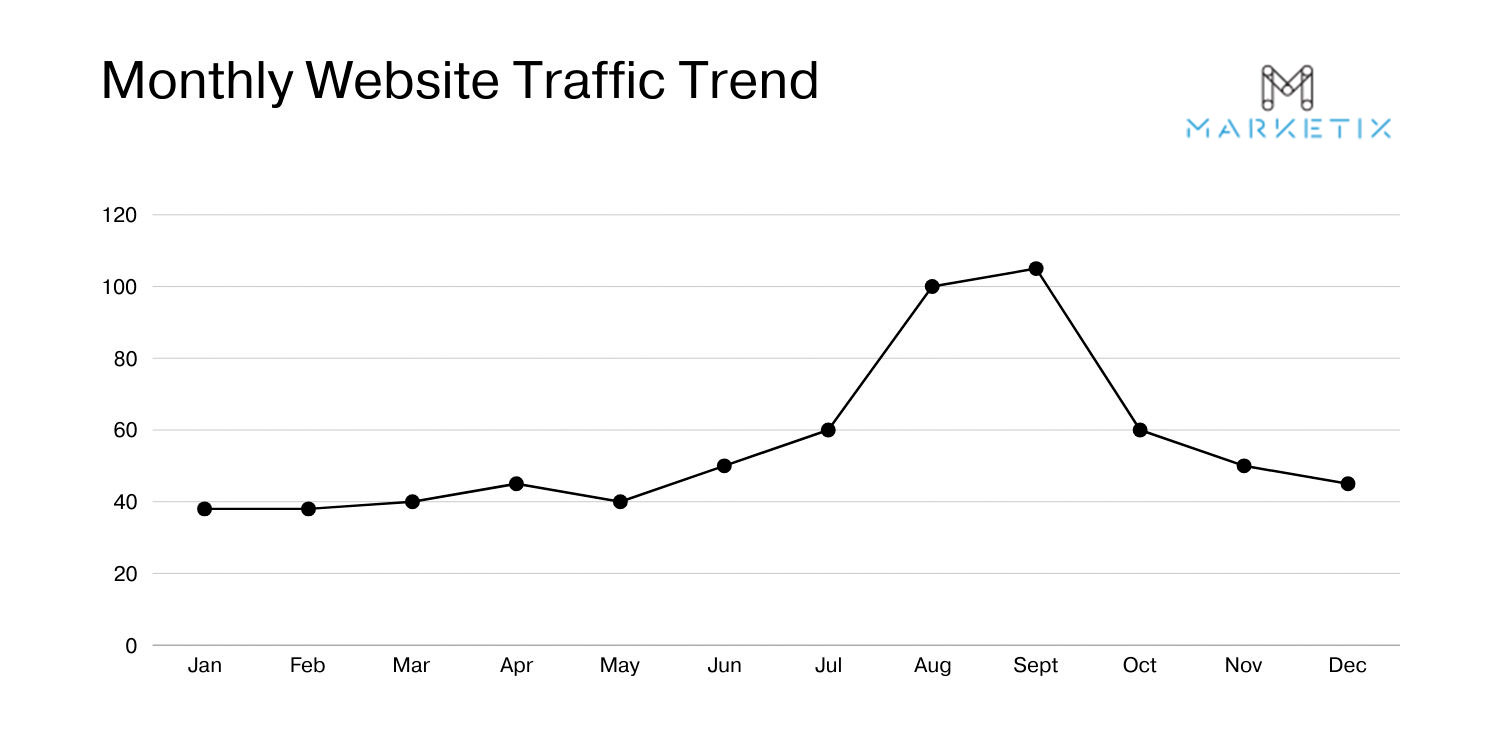
Understanding the seasonal trends that affect your industry can help you anticipate changes in traffic and plan your content and marketing strategies accordingly. Analysing historical traffic data, like the sample graph provided, allows you to identify these patterns and adjust your expectations and strategies.
How To Approach This?
To reduce the effects of seasonality on your website, develop a content calendar that aligns with anticipated peak times and prepares for slower periods.
During peak seasons, focus on targeting high-intent keywords and launch aggressive marketing campaigns that capitalise on increased consumer interest.
In contrast, use off-peak seasons to improve your site’s SEO, update or repurpose existing content, and build a content reserve that can be published during busier times.
Lastly, you can engage with your existing or past audience through email marketing or social media to maintain brand awareness and traffic during slower periods.
Technical Issues
Technical issues can significantly impact a website's search rankings and website traffic, often manifesting as crawl errors, slow load times, or complex rendering issues.
We at Marketix Digital employ the C.R.I.C.S framework (Crawl, Render, Index, Cache, Serve) to systematically diagnose and resolve these issues, enhancing site performance and visibility in search results.
The process begins with the 'Crawl' stage, where we assess how Google's bots interact with your site. We identify and rectify barriers such as server response problems, improper redirects, and broken links that prevent effective crawling. In the 'Render' stage, we focus on ensuring that Google accurately interprets and displays your site's content, optimising elements like JavaScript and CSS to improve compatibility with Google's rendering processes.
Our Recommended Solution:
Conduct a comprehensive technical SEO audit using the C.R.I.C.S framework to address and resolve technical issues. Start by ensuring your website is fully accessible to search engines, and checking for server errors or misconfigurations in your robots.txt file. Focus on rendering to guarantee correct content processing and display. In the 'Index' phase, manage no-index and canonical tags to ensure that only relevant pages are indexed, avoiding duplication.
In the 'Cache' stage, ensure that Google's cache accurately reflects your current site content, which is vital for delivering relevant information to users.
Finally, in the 'Serve' stage, analyse server logs and Googlebot interactions to refine how your site appears in search results. Addressing these stages effectively will boost your site’s visibility and ranking, helping to overcome any technical barriers to performance.
Traffic Loss Due to Domain Migration
Migrating to a new domain is a significant step for any business but can lead to substantial drops in organic traffic if not executed properly. This typically occurs due to the loss of search engine trust and authority that was established by the old domain, which doesn't automatically transfer to the new one. Additionally, improperly redirected URLs, lost backlinks, or changes in site structure during the migration process can exacerbate the situation, leading to a further decline in search visibility and user engagement.
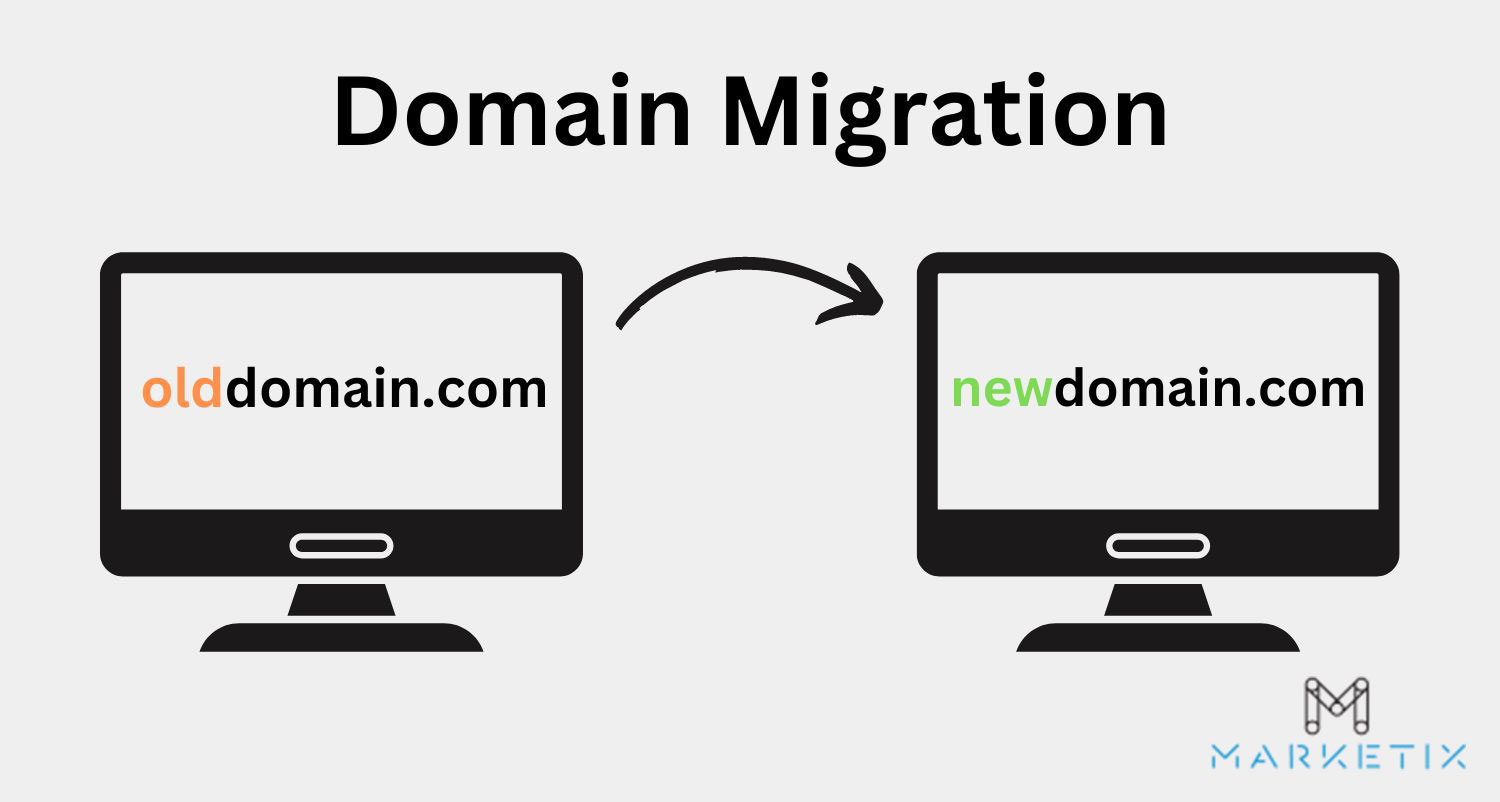
It is a good practice to always plan the execution process before the domain migration to minimise any negative impacts on SEO.
You need to make sure that the URL structure is maintained as much as possible, and old URLs are correctly redirected to their new counterparts with 301 redirects, which pass most of the link equity and ranking power to the new URLs. Moreover, updating all references to the old domain in your content, sitemaps, and related resources is important to help search engines and users find your new domain without confusion.
How to Fix This?
To effectively manage a domain migration, start by preparing a detailed mapping of old URLs to new URLs, which will serve as a guide for setting up 301 redirects. It's also important to update all internal links, so no links are going to the old domain. Once done, register the new domain in your Google Search Console, and inform Google of your change of address.
You can do this by going to the old domain Google Search Console > Settings > Change of Address. From there, click “Select new site”, select the new domain, and click “Validate & Update.”
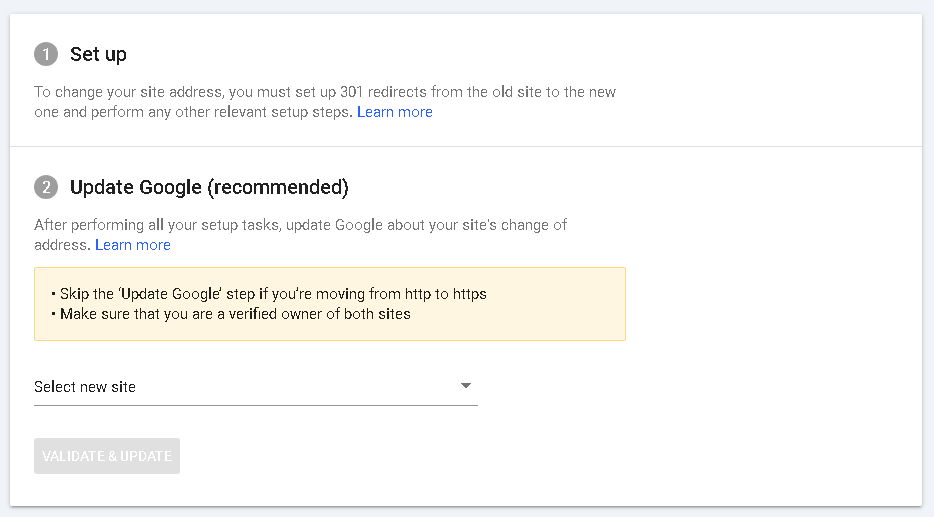
Additionally, you need to make sure that your new domain is fully optimised for SEO before going live.
Check the speed, mobile-friendliness, and accessibility of the new site.
After the migration, closely monitor your site’s performance in terms of traffic and rankings. Regularly check for crawl errors and ensure that search engines are indexing your new domain properly.
Another tip would be to communicate with your audience about the change of domain through emails, social media, and announcements on your site can also help maintain traffic levels.
These steps should be your standard procedure when migrating to the new domain to minimise or avoid the loss of website traffic.
Outranked by Competitors
Being outranked by competitors is a common yet frustrating reason for a drop in organic traffic.
Just like every website owner, your competitors are doing their best to improve their website SEO to perform better in Search Engine Result Pages (SERP).
As search algorithms evolve, they may favour your competitors' newly implemented tactics if they comply with the recent Google guidelines, leading to a shift in rankings.
Well, it’s not just about the organic search. Your competitors might be doing aggressive marketing campaigns, including pay-per-click (PPC) advertising, social media promotions, and improved user engagement strategies, which can divert organic traffic away from your website.
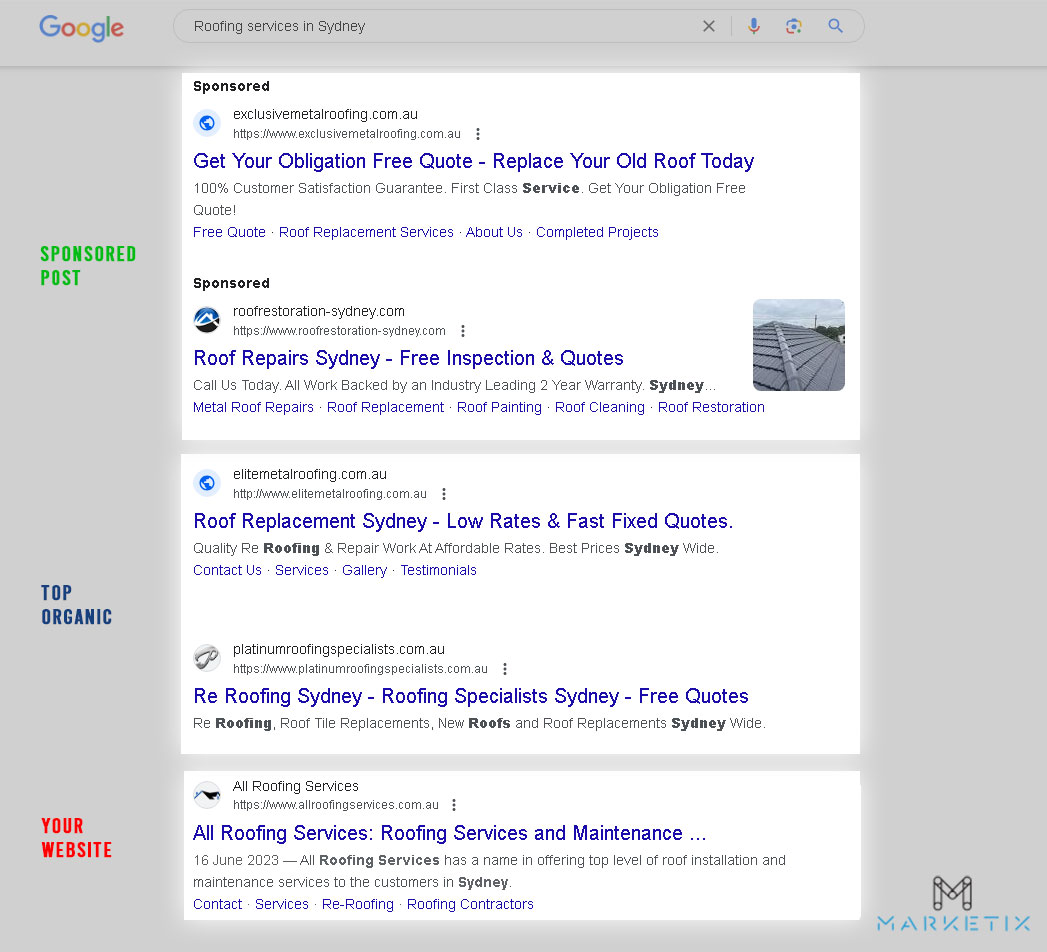
How to Counter This?
Start by enhancing your SEO practices. Update old content, ensure that your keywords are still relevant, and optimise your website’s technical performance. Also, we recommend that your SEO practices should always comply with each Google Core Algorithm update to increase the chances of ranking higher on search engines.
Implement or improve your content marketing strategy by regularly publishing high-quality, informative, and engaging content that meets the needs and interests of your target audience. Increasing the frequency and quality of your posts can significantly boost your site's authority and rankings.
Consider adopting or increasing your investment in PPC campaigns to supplement your organic efforts, especially in areas where you're currently weaker than your competitors.
Lastly, keep monitoring your competitors' strategies and adapt your tactics accordingly. You can use Google Search Console or Ahrefs to regularly morning the rankings and website organic traffic. Partnering with a professional SEO agency like Marketix Digital can provide you with the expertise and insights needed to develop a solid strategy that addresses these challenges effectively.
Manual Penalties
A manual penalty from Google signifies a serious issue, leading to substantial declines in your website's organic traffic.
Such penalties are issued when Google's review team detects that your site has violated the Webmaster Guidelines.
Common infractions include using unnatural links, keyword stuffing, cloaking, or employing deceptive redirects. The repercussions can range from decreased rankings for specific keywords to complete removal from Google's search results.
Upon receiving a manual penalty, Google provides a notification through your Google Search Console.
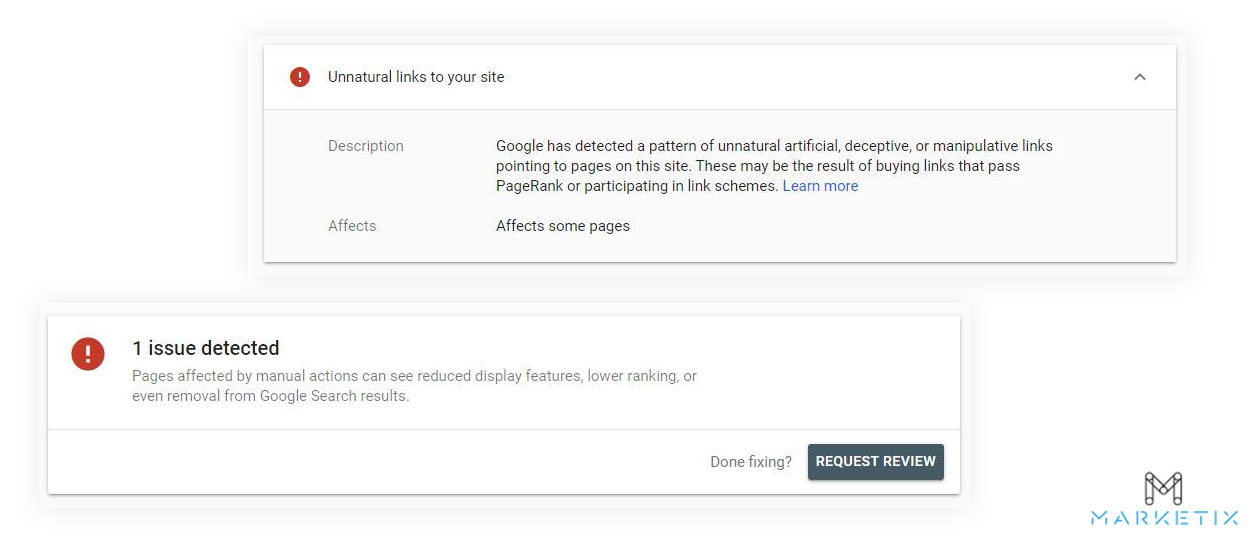
How to Comply With This?
Initiate the recovery by aligning your website with Google's guidelines. Once all modifications are complete, submit a reconsideration request via Google Search Console, outlining the corrective actions taken and detailing compliance measures. You need to make sure that your documentation is comprehensive and communication transparent.
Recovery times vary, and immediate restoration of previous rankings is not guaranteed.
If the penalty's nature is complex or you find the remediation daunting, professional assistance might be necessary.
If you are having trouble fixing the penalty issue, Marketix would be more than happy to help you sort this out. Check out our Google Penalty Recovery Service.
Attacked by a Black Hat Method
Believe it or not, black hat SEO tactics are still employed by some to undermine competitor rankings. These methods are unethical and against Google's guidelines, involving techniques like link farms, keyword stuffing, cloaking, and malicious hacks such as injecting harmful code or creating fake pages.
An attack can severely damage a site's credibility and search rankings almost overnight. Victims may notice unexplained changes to their site content, sudden drops in traffic, or alerts from security tools.
The aftermath of such attacks can be daunting as they can make a site appear untrustworthy to both users and search engines. Websites hit by black hat tactics might suffer long-term consequences, including a tarnished reputation and a significant drop in legitimate traffic. Monitoring tools often catch unusual spikes in activity or the appearance of unfamiliar backlinks, which are telltale signs of such foul play.
How to Fix This?
Immediate action is important when dealing with black hat SEO attacks. Begin by conducting a thorough security audit to identify and remove any malicious code or content that has been added to your site. Update all software to its latest versions and change passwords to strengthen security measures. Next, use tools like Ahrefs to review your backlink profile for any suspicious links and disavow them to mitigate any negative SEO impacts.
Continuously monitor your website for signs of tampering or unusual traffic patterns. Implementing solid security protocols and regularly updating them can prevent future attacks. If the situation is severe and you struggle to resolve these issues alone, consider hiring a professional SEO service that specialises in recovery from SEO attacks.
Final Thoughts from Marketix Digital
Addressing a sudden drop in organic traffic requires a solid and structured approach. It's important to diagnose the underlying cause accurately before implementing corrective measures.
For businesses experiencing these challenges, it's advisable not to tackle them in isolation. Getting in touch with experts would be a better decision as they know how to approach it better.
Just so you know, Marketix Digital offers a free audit for websites that have noticed a drop in traffic, providing insights into potential issues and actionable recommendations to enhance your site's performance. So, if you're having a hard time identifying why your website traffic has declined, or if you need professional advice on how to recover and improve your website's traffic, don't hesitate to reach out to us. Our team of SEO experts is well-equipped to analyse your website, identify the root causes of the drop in traffic, and help you implement tailored strategies that will not only recover lost traffic but also realign your website to a much better path of long-term success.
Recent Posts
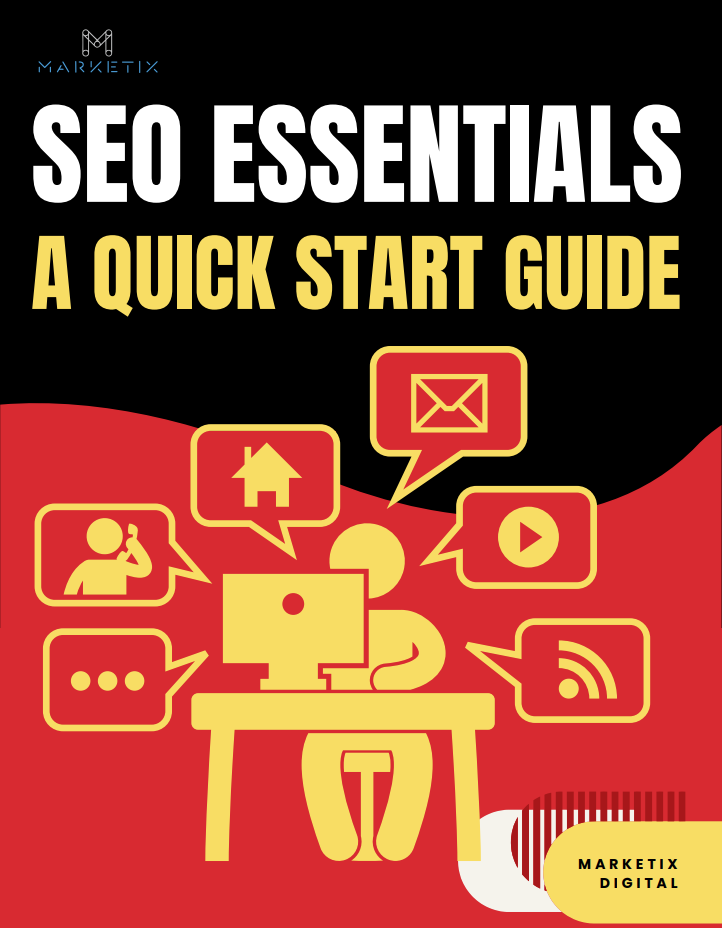
Free Download SEO Book
Download our 24-page SEO book to learn:
- How SEO Really Works
- How to Rank #1
- Content & SEO
- Choosing an SEO Agency
Thank you!
You have successfully joined our subscriber list.

